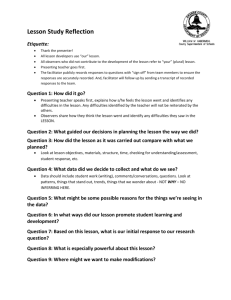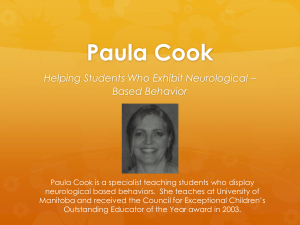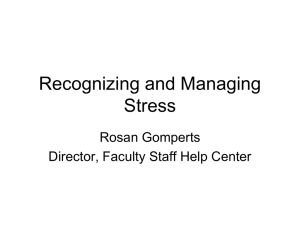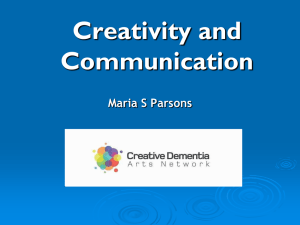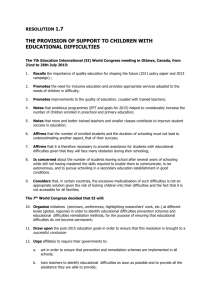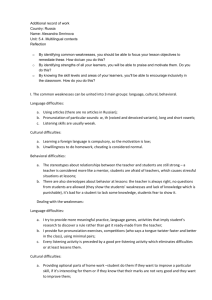Scarning School SEND Provision
advertisement
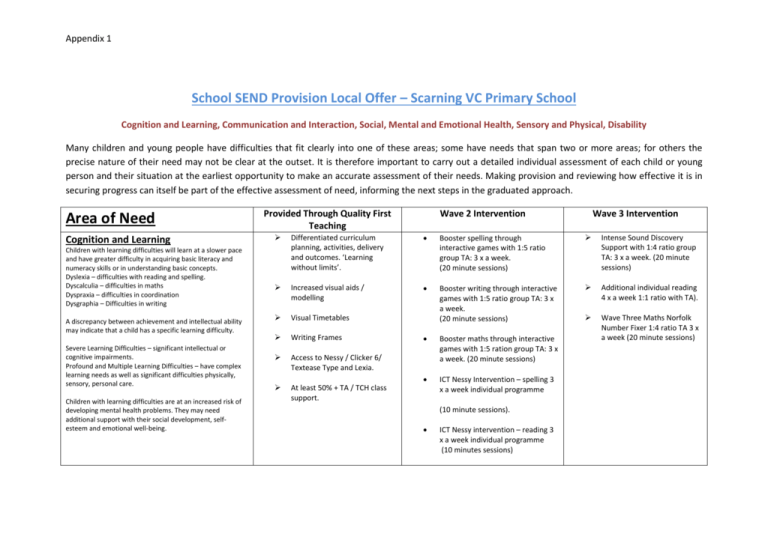
Appendix 1 School SEND Provision Local Offer – Scarning VC Primary School Cognition and Learning, Communication and Interaction, Social, Mental and Emotional Health, Sensory and Physical, Disability Many children and young people have difficulties that fit clearly into one of these areas; some have needs that span two or more areas; for others the precise nature of their need may not be clear at the outset. It is therefore important to carry out a detailed individual assessment of each child or young person and their situation at the earliest opportunity to make an accurate assessment of their needs. Making provision and reviewing how effective it is in securing progress can itself be part of the effective assessment of need, informing the next steps in the graduated approach. Area of Need Cognition and Learning Children with learning difficulties will learn at a slower pace and have greater difficulty in acquiring basic literacy and numeracy skills or in understanding basic concepts. Dyslexia – difficulties with reading and spelling. Dyscalculia – difficulties in maths Dyspraxia – difficulties in coordination Dysgraphia – Difficulties in writing A discrepancy between achievement and intellectual ability may indicate that a child has a specific learning difficulty. Severe Learning Difficulties – significant intellectual or cognitive impairments. Profound and Multiple Learning Difficulties – have complex learning needs as well as significant difficulties physically, sensory, personal care. Children with learning difficulties are at an increased risk of developing mental health problems. They may need additional support with their social development, selfesteem and emotional well-being. Provided Through Quality First Teaching Wave 2 Intervention Wave 3 Intervention Differentiated curriculum planning, activities, delivery and outcomes. ‘Learning without limits’. Booster spelling through interactive games with 1:5 ratio group TA: 3 x a week. (20 minute sessions) Intense Sound Discovery Support with 1:4 ratio group TA: 3 x a week. (20 minute sessions) Increased visual aids / modelling Additional individual reading 4 x a week 1:1 ratio with TA). Visual Timetables Booster writing through interactive games with 1:5 ratio group TA: 3 x a week. (20 minute sessions) Writing Frames Wave Three Maths Norfolk Number Fixer 1:4 ratio TA 3 x a week (20 minute sessions) Access to Nessy / Clicker 6/ Textease Type and Lexia. At least 50% + TA / TCH class support. Booster maths through interactive games with 1:5 ration group TA: 3 x a week. (20 minute sessions) ICT Nessy Intervention – spelling 3 x a week individual programme (10 minute sessions). ICT Nessy intervention – reading 3 x a week individual programme (10 minutes sessions) Appendix 1 Differentiated curriculum planning, delivery and outcomes. Eg: simplified language, increased visual aids, appropriate ‘blank level’ questions, modelling. Speech and Language difficulties – receptive and expressive language. Visual timetables, choice boards, ‘Now and Next’ Boards. Specific Learning difficulties – dyslexia Use of symbols / pictures to communicate PECS – Picture Exchange Communication cards Structured school and classroom routines. ‘Time to Talk’ / Circle times, worries box. Communication and Interaction Children can have difficulties in one or more of the areas of speech, language and communication. These children need help to develop their linguistic competence in order to support their thinking, as well as their communication skills. Physical, sensory impairment – hearing loss Autism Spectrum Condition Speech and Language activities tailored to each children Speech and Language aims – daily individual or small group (1:4 ratio) with TA / SENCO. Speech and Language support (with speech therapist / SENCO – EKLAN trained – ½ termly blocked teaching / weekly. ICT Clicker – as appropriate typing programme that reads back and helps to sequence thoughts. Makaton – Sign-a-long trained TA’s. BSL trained TA. Textease Type – as appropriate typing programme that reads back and helps to sequence thoughts and ideas. ‘Time to Talk’ – Pastoral TA lunchtime opportunities / or other times as appropriate / needed. Learning Café – Toast Time Monday mornings. HLTA Nurture group trained. Small group circle time 1:6 with TA / TCH. Individual counselling – ‘Time to Talk’ – daily as appropriate. Teacher / Staff mentors for children. Home school record book / emails daily. Social, Mental and Emotional Health For some children, difficulties in emotional and social development, can mean that they require additional and different provisions in order for them to achieve. Class reward systems. Circle of friends – friendship fairies (where appropriate). Problems of conduct: Oppositional Problems, aggressions. Lunchtime safe haven – clubs Self Harming: substance abuse, eating disorders. Yr6 Playtime buddy Massage in school – SENCO trained. Bench buddies at playtimes and lunchtimes. Additional swimming provisions – where appropriate and needed. Problems of mood: anxiety / depression. Attention Deficit Hyperactivity Disorder (ADHD) Attachment Disorder Autism Pervasive Developmental Disorder Schizophrenia or Bipolar Disorder. Appendix 1 Sensory and Physical There is a wide range of physical and sensory difficulties. Many children require minor adaptations to the curriculum or physical environment – reasonable adjustments under the Equality Act 2010. Visual Impairment Hearing impairment Multi-sensory impairment Physical disability – require additional on-going support and equipment to access all opportunities available to their peers. Flexible teaching arrangements Staff aware of implications of physical impairment. Writing slopes Pencil grips IPad Sensory cupboard (in development). Brain Gym exercises daily with TCH (5 minutes) – stimulating leaf and right side of the brain and pressure learning buttons. Individual support in class / PE / break and lunchtimes. Physiotherapy and Occupational therapy programmes (daily 1:1 ratio TA 15 minutes) Touch screen computer. Different size mice for computer. Meet and greet points – before and after crowds / different entrance – depending on situation. Additional swimming sessions where appropriate / need. Makaton – sign a long trained TAs. Additional handwriting practice twice a week with TCH / TA. Disability Increased visual aids / auditory aids when appropriate. Medically trained staff appropriate to medical / physically disability. Many disabled children also have an SEN. Where in this case access arrangements and other adjustments should be considered as part of the SEN planning and review. Use of symbols / pictures PECS. Additional swimming sessions Brain Gym exercises daily with TCH (5 minutes). Structured school / classroom routines. Access to schools sensory cupboard (working progress). Organisation of classroom / access to resources / belongings. Physiotherapist / Occupational therapist programme (daily 1:1 ratio TA 15 minutes). Pencil grips Ipad Touch screen computer / different size pointer and mouse. Writing slopes The school must make reasonable adjustments to ensure disabled children are not at a substantial disadvantage. Adjustments to procedures, criteria and practices must be planned and put into place in advance.
